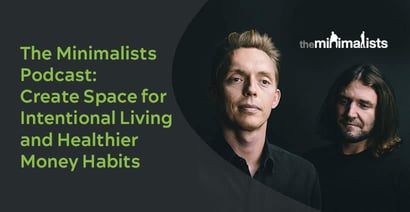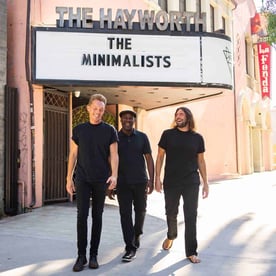
In a Nutshell: If you think minimalism is only about finding room for furniture and emptying junk drawers, think again. In the hands of Joshua Fields Millburn and Ryan Nicodemus, hosts of The Minimalists Podcast, minimalism is about creating space for the abundance that matters most. With co-host T.K. Coleman, Josh and Ryan empower millions of listeners to think for themselves and act accordingly. That can mean many things, but one thing it almost always means is a more purposeful relationship with money and achieving financial goals.
Minimalism is the art of living with less. Or it’s the art of finding a place for everything. Or it’s the art of finally cleaning out your sock drawer.
Because of its status as a watchword for a movement, minimalism has so many definitions that a list of them would be anything but minimal.
That may be why The Minimalists Podcast is one of the most downloaded in the world. Hosts Joshua Fields Millburn and Ryan Nicodemus cut through the clutter of definitions to get at what really matters about minimalism, which is making room for abundance.

“Minimalism is a tool to rid yourself of life’s excess in favor of focusing on what’s important — so you can find happiness, fulfillment, and freedom,” they say on their website. That’s advice you can take to the bank.
Through almost 400 episodes (and counting) over about 12 years, Josh and Ryan take listeners on a journey toward what they call a purpose-driven life. It’s a process, not a destination, and the details differ for each individual. But if you’re doing what you want to do for reasons of your own, you’re on the right track.
Counterintuitively, Josh and Ryan added a co-host to their podcast in August 2022 after frequently welcoming him as a guest. Philosopher and educator T.K. Coleman, Director of Entrepreneurial Education at the Foundation for Economic Education, brings another perspective on minimalism to the podcast.
“Josh and Ryan asked me to join to have deeper, more substantial conversations about minimalism that could not only help more people but also bring some new understandings to the table,” T.K. said. “The most important thing to convey is that minimalism isn’t mostly about stuff. It’s about space.”
Live Intentionally: The Essence of Minimalism
Space for what, you might ask. Money has a lot to do with minimalism, but in T.K.’s and the Minimalists’ conception, it’s not about cutting expenses to the bone and living in a van — unless that’s what you’re into.
A fundamental perspective shift comes from understanding the concept of mimetic desire, which refers to internalized, culturally inherited desires that aren’t expressions of personal values. When you think about it, people desire many things almost by habit or because the people around them desire them.
“Mime” is a root word for mimetic, and people express mimetic desires as if they were robots. Closely related is the concept of mimetic success.

“That’s when you’re great at stuff, you’re awesome at stuff, you’re winning the game,” T.K. said. “But then you stop to think, hey, wait a minute, I never even asked to play.”
Getting over that hump of realization about mimetic desire and consumerism, T.K. said, is about connecting with the three Ps, which are your preferences, your priorities, and your principles.
Preferences are the things you would truly desire if someone could wave a magic wand and give them to you. Priorities are the things you’re willing to put first. And principles are your non-negotiables.
It takes more than a little introspection to list your three Ps and really mean it. But don’t stress — many people live their entire lives without vibing with these concepts. If you’re one of the lucky ones to be in a position to do the work, take your time and make the most of it.
“Thinking about those three Ps is the key to living intentionally in a way that can help you escape the prison of mimetic desire that holds so many people back,” T.K. said.
Decluttering Strategies Depend on the Individual
The classic minimalist concept of decluttering is the logical next step because now you have a plan, and some things have to go so you can create the space you need to achieve and acquire on your terms.
“When you take care of those three Ps, one of the outcomes is you have this organic, effortless realization of the clutter in your life,” T.K. said. “You’re saying, I know what I want, and I know what I’m willing to sacrifice to obtain it.”
T.K. defines clutter as anything that gets in the way. It doesn’t matter how much you paid for it, how you obtained it, or even if your grandmother gave it to you. If it’s in the way, it’s clutter.
But clutter is a subjective term because what may be clutter to you might be the greatest thing in the world to someone else.

“The age-old cliche we capture this idea with is one person’s garbage is another person’s treasure,” T.K. said.
For example, T.K. has an actor friend who watches about six hours of TV a day as a kind of professional development exercise. T.K. said he’d go crazy sitting in front of a screen for that long. You do you.
Another point is that clutter can take many forms. Sentimental items may have a hold because you value the person who left them behind. Moving clutter takes root when people change locations or residences but can’t bring themselves to discard items that no longer have a place. A third type is calendar clutter, unwanted obligations or commitments you have because you’re afraid to say no.
“By the way, none of those things are directly about money, but every single one of those things impacts your financial condition and potential big time,” T.K. said.
Find a Purpose for Your Prosperity Journey
The Minimalists Podcast is free to download or stream wherever you go for podcasts. There’s a plethora of free downloadable resources on the website. Josh and Ryan are also New York Times-bestselling authors and Emmy-nominated Netflix documentarians.
Because they don’t accept advertising support for The Minimalists Podcast, they have a Patreon page. A monthly Patreon membership opens access to extended versions of the podcasts. With T.K., the guys also do live events.

By now, it should be evident that a purpose-driven, minimalist life may involve cleaning out your sock drawer, but it doesn’t have to. One podcast episode, “This Is Not Minimalism,” marvels that commenters always ask what a specific topic has to do with minimalism if the subject is about something other than moving boxes. Another discusses unhealthy family relationships as a form of clutter. Another looks at the psychological baggage of perfectionism, which holds so many people back from creating progress in their lives.
Embarking on a purpose-driven prosperity journey may seem challenging, especially if you’re starting from scratch. T.K. recommends taking things slowly.
“As I often say, dreams don’t come true, decisions do,” T.K. said. “I used to work as a financial advisor, and one of the things I found is that it’s incredibly easy for people to hide behind vague answers.”
So get meticulous about the steps you need to take and the decisions you need to make. Dreaming about being a millionaire won’t get the ball rolling or result in prosperity worth having. Instead, quantify your dreams in economic teams and know what you’d do with every dollar if you got that million. Put your three Ps to work.
“Usually, when we talk about money, we keep it separate from dreams, so we let ourselves get away with saying lazy things,” T.K. said. “You want to be a millionaire? That’s cool. So what do you need to do?”






